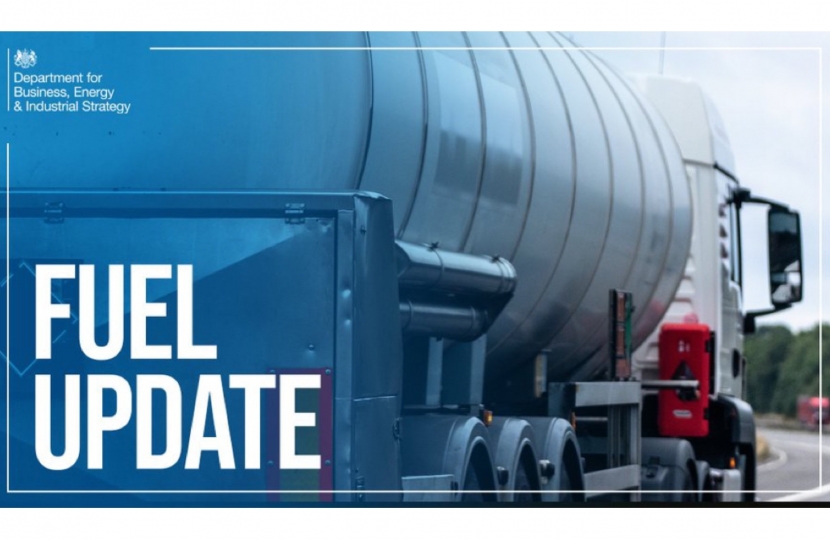
The Government has announced a temporary relaxation of competition laws and new measures to increase the number of HGV drivers, helping to ease pressures affecting petrol stations across the UK as a result of increased demand.
There is no shortage of fuel in the UK. A spike in localised demand has led to increased pressures at our petrol stations - and we will take whatever action necessary to resolve this. That is why the Government is implementing The Downstream Oil Protocol – a temporary exemption to competition laws to enable information sharing between petrol stations – as well as introducing short term visas for HGV drivers, increasing HGV testing, and establishing skills bootcamps to train up to 3,000 more people to become HGV drivers and provide more resilience in the system.
Up to 4,000 people will soon be able to take advantage of training courses to become HGV drivers, as part of a package of measures announced today by the Government to ease temporary supply chain pressures in food haulage industries, brought on by the pandemic and the global economy rebounding around the world.
The Department for Education is investing up to £10 million to create new skills bootcamps to train up to 3,000 more people to become HGV drivers. The free, short, intensive courses will train drivers to be road-ready and gain a category C or category C&E licence, helping to tackle the current HGV driver shortage. An additional 1,000 people are expected to be trained through courses accessed locally and funded by the government’s adult education budget.
The Department for Transport (DfT), along with leading logistics organisations have worked with the DVLA to send nearly 1 million letters to thank HGV drivers for their vital role in supporting our economy, and to encourage those who have left the industry to return. The letter, which will arrive on doormats over the coming days, sets out that the steps the road haulage sector is taking to improve the industry, including increased wages, flexible working and fixed hours.
Alongside this, 5,000 HGV drivers will be able to come to the UK for 3 months in the run-up to Christmas, providing short-term relief for the haulage industry. A further 5,500 visas for poultry workers will also be made available for the same short period, to avoid any potential further pressures on the food industry during this exceptional period.
Recruitment for additional short-term HGV drivers and poultry workers will begin in October and these visas will be valid until 24 December 2021. UK Visas and Immigration (UKVI) are preparing to process the required visa applications, once made, in a timely manner.
The Business Secretary met with senior executives from the fuel industry following the recent supply chain issues at petrol forecourts in some areas of the UK. To view the Business Secretary’s Statement following his meeting with the fuel industry, please visit: https://www.gov.uk/government/news/statement-following-meeting-between-the-business-secretary-and-fuel-industry.
Military drivers and extension to specific HGV licences
In addition to the Government’s decision to implement The Downstream Oil Protocol, introducing short term visas for HGV drivers, increasing HGV testing, and establishing skills bootcamps, the Government has also announced further measures to help further ease supply chain pressures and spikes in localised demand for fuel, including the approval to put on standby a pool of military drivers and extension to specific HGV licences.
While there is no fuel shortage at the refineries and storage areas, and the fuel industry expects demand will return to normal levels in the coming days, it is right that we take sensible, precautionary steps. That is why the Government has put a limited number of military tanker drivers on a state of readiness to be deployed if necessary – as a temporary measure to help ease pressures caused by spikes in localised demand for fuel.
The military drivers will now receive specialised training before deploying, enabling them to seamlessly work with the industry to address the supply chain pressures. The Military Aid to the Civil Authorities (MACA) request was issued by Business Secretary Kwasi Kwarteng on Monday.
The Transport Secretary has also authorised an extension to ADR driver licences, which allow drivers to transport goods, such as fuel. This measure will apply to licences expiring between 27 September 2021 and 31 December 2021, and extend their validity until 31 January 2022. This will provide immediate relief to the shortage of fuel drivers by permitting affected drivers to maximise their available capacity instead of being taken out of circulation for refresher training purposes.
These measures will help to prevent any further disruption, creating additional capacity if needed as people begin returning to their regular buying habits.
For any more information on the measures the Government has implemented to further ease fuel supply chain pressures, including comments from the Business, Defence and Transport Secretaires, please visit: https://www.gov.uk/government/news/new-measures-to-further-ease-fuel-supply-chain-pressures.
***MONDAY 4TH OCTOBER UPDATE***
From today, Military tanker personnel will be deployed across the country to help deliver fuel supplies, relieving pressure on petrol stations and addressing the shortage of HGV drivers.
Demand for fuel has stabilised over the week, with more fuel now being delivered than is being sold, however some parts of the country still face challenges because of increased demand. That is why from today, almost 200 trained military personnel will be put on the road to deliver fuel supplies – building on the measures the Government has already taken to ease pressures including a temporary easing of competition rules, and allowing up to 300 fuel tanker drivers into the UK on a temporary basis.
This will help to tackle the short-term disruption we are seeing at the fuel pumps – and the sooner we return to our normal buying habits, the sooner we can return to normal. For more information, please visit: https://www.gov.uk/government/news/military-finish-up-training-to-start-fuel-deliveries-as-government-extends-support-to-industry
Testing
Fuel tanker drivers need additional safety qualifications, which the Government will work with industry to ensure drivers can access as quickly as possible.
To help make sure new drivers can be road-ready as quickly as possible, the DfT have also agreed to work with Driver and Vehicles Standards Agency (DVSA) to ensure that tests will be available for participants who have completed training courses as soon as possible.
The Ministry of Defence (MOD) is also announcing the immediate deployment of their Defence Driving Examiners (DDEs) to increase the country’s testing capacity. MOD examiners will work alongside DVSA examiners, providing thousands of extra tests over the next 12 weeks.
The Government is also bringing in legislation to allow delegated driving examiners at the three emergency services and the MOD to be able to conduct driving tests for one another. This will give the emergency services greater flexibility and help increase the number of tests DVSA examiners can provide HGV examiners.
The Government will also provide funding for both medical and HGV licences for any adult who completes an HGV driving qualification accessed through the Adult Education Budget in the academic year 2021/22. Previously, adults who took these qualifications had to pay for their own licences. This change will be backdated and applied to anyone who started one of these qualifications on or after August 1st 2021.
Long term Investment
The Government wants to see employers make long term investments in the UK domestic workforce instead of relying on overseas labour to build a high-wage, high-skill economy.
Visas will not be the long-term solution, and reform within the industry is vital. That’s why the Government continues to support the industry in solving this issue in the long-term through improved testing and hiring, with better pay, working conditions and diversity.
The Government has been able to bring forward these solutions in response to a global issue made worse by coronavirus thanks to our existing work in this area. We have already taken a range of steps to support the industry, including streamlining the process for new HGV drivers and increasing the number of driving tests. Our measures provided a rapid increase in capacity and allow for an extra 50,000 tests to take place per year.
Progress has already been made in testing and hiring, with improving pay, working conditions and diversity. We continue to closely monitor labour supply and work with sector leaders to understand how we can best ease particular pinch points. Through our Plan for Jobs we’re helping people across the UK retrain, build new skills and get back into work.
For more information on the action the Government is taking to tackle the shortage of HGV drivers, including comments from the Transport, Education and Environment secretaries, please visit: https://www.gov.uk/government/news/more-support-to-help-people-to-become-hgv-drivers-among-package-of-government-measures-to-ease-risk-of-shortages.
